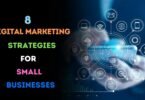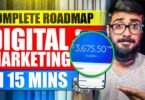Mastering the Art of Google Digital Marketing
Digital marketing has revolutionized the way businesses connect with their audience, and at the forefront of this evolution stands Google Digital Marketing. In this comprehensive guide, we will explore the ins and outs of leveraging Google’s powerful tools to propel your business to new heights.
- Introduction
- Definition of Google Digital Marketing
Google Digital Marketing refers to the use of Google’s suite of online marketing tools and platforms to promote products and services. It encompasses a range of strategies, from paid advertising with Google Ads to harnessing the power of search engine optimization (SEO) for organic visibility.
- Importance of Digital Marketing for Businesses
In an era dominated by online interactions, businesses must establish a robust digital presence. Google Digital Marketing offers unparalleled opportunities to reach a global audience, drive traffic, and boost conversions.
- Google Digital Marketing Basics
- Overview of Google’s Marketing Tools
Google provides a plethora of tools for digital marketers, each serving a unique purpose. From the versatile Google Ads to the insightful Google Analytics, understanding these tools is crucial for a successful digital marketing strategy.
- Key Components of Google Digital Marketing
Successful digital marketing involves a holistic approach. Key components include SEO, paid advertising, analytics, and social media integration. Each element plays a pivotal role in creating a well-rounded and effective campaign.
III. Google Ads: A Deep Dive
- Setting Up Google Ads Campaigns
Creating a Google Ads campaign requires careful planning. From defining your target audience to setting a budget, every step influences the success of your campaign.
- Choosing the Right Keywords
Keywords are the backbone of Google Ads. Choosing the right keywords ensures that your ads reach the most relevant audience, maximizing the return on investment.
- Understanding Ad Formats
Google offers various ad formats, from text ads to visually engaging display ads. Understanding each format helps in creating compelling and effective advertisements.
- Google Analytics: Unveiling Insights
- Installing Google Analytics
The journey to digital marketing success begins with installing Google Analytics. This powerful tool provides invaluable insights into user behavior, helping marketers make data-driven decisions.
- Analyzing User Behavior
Google Analytics goes beyond page views. Analyzing user behavior provides insights into what works and what doesn’t, enabling marketers to refine their strategies for optimal results.
- Utilizing Data for Optimization
The data collected through Google Analytics is a goldmine for optimization. From tweaking website content to refining advertising strategies, data-driven optimization is the key to sustained success.
- Search Engine Optimization (SEO) Strategies
- On-Page SEO Techniques
On-page SEO involves optimizing individual web pages for search engines. From meta tags to keyword placement, on-page techniques improve a website’s visibility in search engine results.
- Off-Page SEO Strategies
Off-page SEO focuses on activities outside the website itself, such as link building and social media promotion. These strategies enhance the website’s authority and credibility.
- Importance of Quality Content
In the digital landscape, content is king. Producing high-quality, relevant, and engaging content not only attracts visitors but also improves search engine rankings.
- Google My Business: Local Presence
- Creating a Google My Business Profile
For businesses with a physical presence, Google My Business is a game-changer. Creating a detailed profile ensures visibility in local searches, driving foot traffic to brick-and-mortar locations.
- Leveraging Local SEO for Visibility
Local SEO strategies, integrated with Google My Business, help businesses appear in local search results. This is particularly vital for attracting nearby customers.
VII. YouTube Marketing with Google
- Creating Engaging YouTube Content
YouTube is the second-largest search engine globally, making it a crucial platform for digital marketing. Crafting engaging video content captivates audiences and enhances brand visibility.
- Optimizing Videos for Search
Optimizing videos for search involves using relevant keywords, creating compelling thumbnails, and utilizing video descriptions effectively. This ensures videos rank higher in YouTube search results.
VIII. Social Media Integration
- Connecting Social Media Platforms
Integrating social media with Google Digital Marketing extends the reach of campaigns. Sharing content on platforms like Facebook, Twitter, and Instagram amplifies brand awareness.
- Harnessing Social Signals for SEO
Social signals, such as likes, shares, and comments, influence search engine rankings. Actively engaging with the audience on social media contributes to a positive online presence.
- Google Digital Marketing Success Stories
- Real-world Examples of Effective Campaigns
Examining successful Google Digital Marketing campaigns provides valuable insights. Case studies highlight strategies that have delivered tangible results for businesses across industries.
- Learning from Successes and Failures
Every campaign, successful or not, offers lessons. Analyzing both successes and failures helps marketers refine their approach, adapting to the dynamic landscape of digital marketing.
- Emerging Trends in Google Digital Marketing
- Artificial Intelligence and Machine Learning
The integration of artificial intelligence and machine learning is reshaping digital marketing. From personalized ads to predictive analytics, these technologies enhance campaign effectiveness.
- Voice Search Optimization
With the rise of voice-activated devices, optimizing content for voice search is crucial. Understanding user intent in voice searches influences content creation and SEO strategies.
- Mobile-First Strategies
As mobile usage continues to soar, adopting mobile-first strategies is imperative. From mobile-friendly website design to mobile-optimized content, catering to the mobile audience is a priority.
- Challenges in Google Digital Marketing
- Adapting to Algorithm Changes
Google frequently updates its algorithms, impacting search rankings and advertising strategies. Staying agile and adapting to these changes is a constant challenge for digital marketers.
- Balancing Paid and Organic Strategies
Finding the right balance between paid advertising and organic strategies is a delicate task. Over-reliance on one at the expense of the other can hinder overall campaign success.
XII. Tips for a Successful Google Digital Marketing Strategy
- Continuous Learning and Adaptation
The digital landscape evolves rapidly. Continuous learning and adaptation to new trends and technologies are essential for staying ahead in the competitive world of Google Digital Marketing.
- Monitoring Analytics and Key Performance Indicators
Regularly monitoring analytics and key performance indicators (KPIs) provides real-time insights. This data-driven approach enables marketers to make informed decisions for ongoing optimization.
XIII. The Future of Google Digital Marketing
- Predictions and Anticipated Developments
The future of Google Digital Marketing holds exciting possibilities. Predictions include further integration of AI, enhanced user personalization, and advancements in immersive technologies.
XIV. Conclusion
- Recap of Key Takeaways
In mastering the art of Google Digital Marketing, a holistic approach is paramount. From understanding Google’s tools to navigating challenges, success lies in a dynamic and adaptive strategy.
- Encouragement for Readers to Dive into Digital Marketing
As we conclude, I encourage readers to embark on their digital marketing journey. The tools and strategies outlined here are the building blocks of a successful campaign, and the ever-evolving landscape presents endless opportunities for growth.






